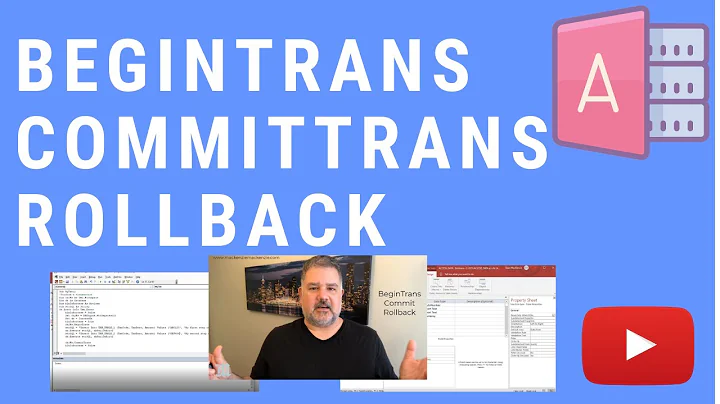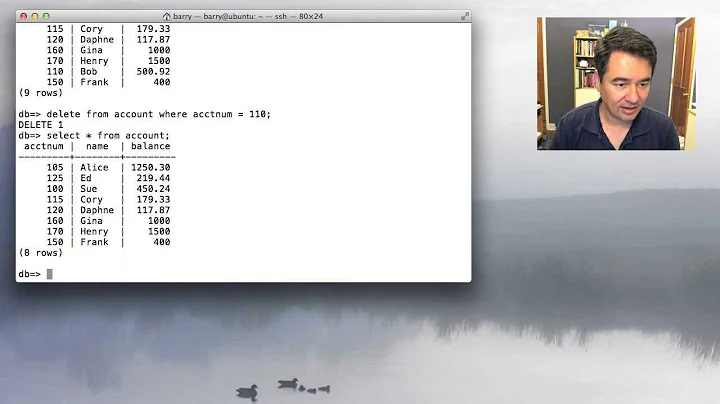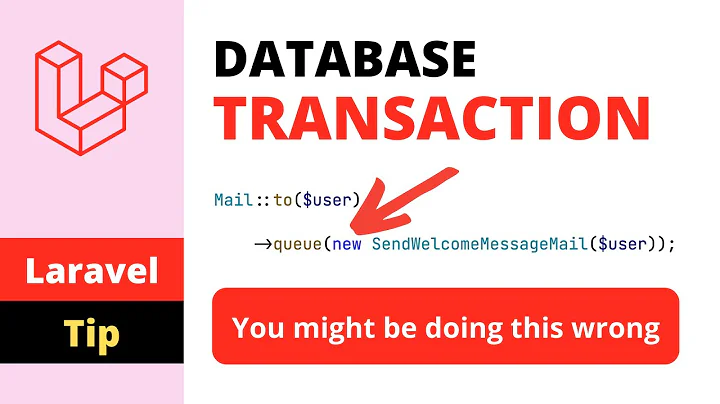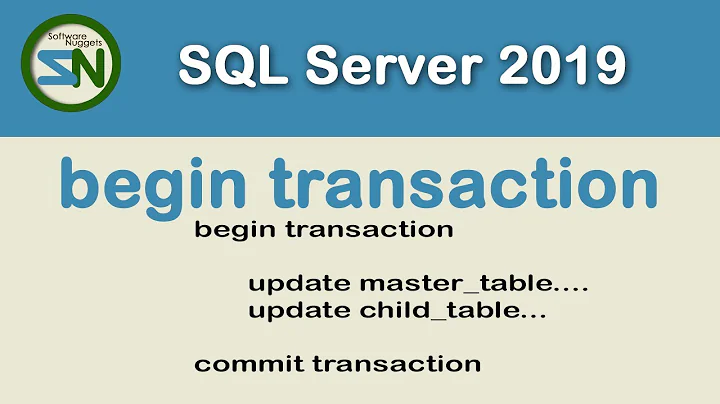Automatic Rollback if COMMIT TRANSACTION is not reached
Solution 1
No, transactions are not rolled back as soon as an error occurs. But you may be using a client-application which applies this policy.
For example, if you are using the mysql command-line client, then it normally stops executing when an error occurs and will quit. Quitting while a transaction is in progress does cause it to be rolled back.
When you are writing your own application, you can control the policy on rollback, but there are some exceptions:
- Quitting (i.e. disconnecting from the database) always rolls back a transaction in progress
- A deadlock or lock-wait timeout implicitly causes a rollback
Other than these conditions, if you invoke a command which generates an error, the error is returned as normal, and you are free to do whatever you like, including committing the transaction anyway.
Solution 2
Use Mysql stored procedure
BEGIN
DECLARE exit handler for sqlexception
BEGIN
ROLLBACK;
END;
DECLARE exit handler for sqlwarning
BEGIN
ROLLBACK;
END;
START TRANSACTION;
INSERT INTO prp_property1 (module_name,environment_name,NAME,VALUE) VALUES ('','production','','300000');
[ERROR]
COMMIT;
END
You can set if warning or error rollback, then you don't need delete, with transaction all entry is deleted.
Solution 3
You may use procedure to do this more effectively.
Transaction with Stored Procedure in MySQL Server
Solution 4
I would like to add to what @MarkR already said. Error Handling, assuming InnoDB engine, happens as described in the Mysql Server Documentation
- If you run out of file space in a tablespace, a MySQL Table is full error occurs and InnoDB rolls back the SQL statement.
- A transaction deadlock causes InnoDB to roll back the entire transaction.
- A duplicate-key error rolls back the SQL statement
- A row too long error rolls back the SQL statement.
- Other errors are mostly detected by the MySQL layer of code (above the InnoDB storage engine level), and they roll back the corresponding SQL statement
My understanding is also that when the Mysql session ends (when the php scripts ends), anything that is not committed is rolled back. I yet have to find a really reliable source to back this statement so do not take my word for it.
Solution 5
I've tested these three situations; mySQL does not roll back automatically.
A transaction deadlock causes InnoDB to roll back the entire transaction. A duplicate-key error rolls back the SQL statement A row too long error rolls back the SQL statement.
Only the affected records fail, the rest of the records succeed unless your application calls "rollback" explicitly.
Related videos on Youtube
Koekiebox
Code loving, pattern poaching, methodology mending person trying to sustain social life... Not (Borat Style). SOreadytohelp
Updated on July 09, 2022Comments
-
Koekiebox almost 2 years
Consider the following:
START TRANSACTION; BEGIN; INSERT INTO prp_property1 (module_name,environment_name,NAME,VALUE) VALUES ('','production','','300000'); /** Assume there is syntax error SQL here...**/ Blah blah blah DELETE FROM prp_property1 WHERE environment_name = 'production'; COMMIT TRANSACTION;Question:
I noticed that the transaction automatically rolls back and the record insert attempt fails.
If I don't provide a error handler or error check along with
ROLLBACK TRANSACTIONas above, is it safe as it seems to be doing the job in an example like above because theCOMMIT TRANSACTIONnever gets executed?I assume the transaction is rolled back immediately and discarded as soon as a error occurs.
-
Koekiebox almost 13 yearsI am using SQLyog as a client.
-
 Rogerio de Moraes over 8 years
Rogerio de Moraes over 8 years
-
-
zerkms almost 13 yearsConfused with documentation: "Rolling back can be a slow operation that may occur implicitly without the user having explicitly asked for it (for example, when an error occurs)." :-S
-
MarkR almost 13 yearsThe documentation is not clear; perhaps it means in the cases I mentioned above?
-
gruner over 11 yearsThanks for the link -- it's the only proper example of error handling that I was able to find!
-
abasterfield over 9 yearsError 1205: Lock wait timeout exceeded does not cause a rollback as long as your server version >= 5.0.13 dev.mysql.com/doc/refman/5.0/en/innodb-error-handling.html



![Laravel DB Transactions: Rollback on Error [Registration Example]](https://i.ytimg.com/vi/GNZCIci0I64/hq720.jpg?sqp=-oaymwEcCNAFEJQDSFXyq4qpAw4IARUAAIhCGAFwAcABBg==&rs=AOn4CLBqz_e5hF3_OWCoyZg2El5_yWr2Cg)






